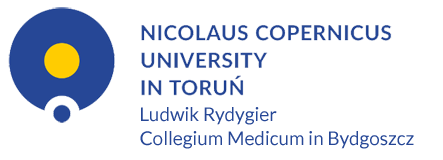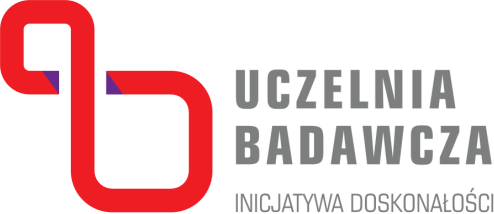Monika Sypniewska and Dawid Adamkiewicz, students of medicine at NCU Collegium Medicum, went to Kenya as volunteers for the project entitled „Treatment with Mission”. They spent nearly six weeks teaching courses for medical personnel in one of the mission hospitals.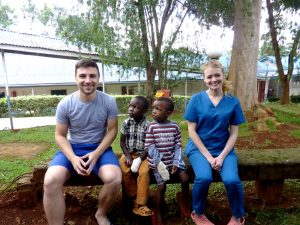
Monika Sypniewska and Dawid Adamkiewicz, students of medicine at NCU Collegium Medicum, went to Kenya as volunteers for the project entitled „Treatment with Mission”. They spent nearly six weeks teaching courses for medical personnel in one of the mission hospitals.
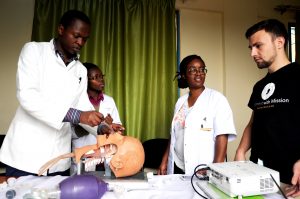 Imagine a hospital with 200 beds and over 300 patients. Since medical care is not denied to anyone, some of the patients are forced to share their beds with others. And there are only five doctors on duty to treat them.
Imagine a hospital with 200 beds and over 300 patients. Since medical care is not denied to anyone, some of the patients are forced to share their beds with others. And there are only five doctors on duty to treat them.
A few words about medical equipment and instruments. We are used to seeing everything organised neatly in a treatment room – all the medications and dressings are described, sorted and nicely shelved. What if there is no treatment room at all, and you need to spend even half an hour trying to find a thermometer or a blood pressure monitor left somewhere in any of the hospital units? If you want to perform CPR in the men’s ward, you need to fetch the oxygen tank from another hospital building. If you want to perform an x-ray scan, there’s a barely breathing apparatus from 1964. Can you imagine an internal medicine unit functioning without ECG equipment or a specialist able to interpret its readings?
Unfortunately, this is not just imagination, but the sad reality of mission hospitals in Kenya. Two students of medicine at NCU Collegium Medicum had an opportunity to do volunteer work in one of them – the Consolata Mission Hospital Kyeni, located at the foot of the second highest mountain in Africa, Mount Kenya.
Monika Sypniewska and Dawid Adamkiewicz, fifth-year students of medicine at NCU Collegium Medicum, went to Kenya as volunteers for the project entitled „Treatment with Mission”. Monika and Dawid, together with four students and one doctor from Poznań, have been assigned to section „How KenYa help You?”. They spent nearly six weeks teaching courses for medical personnel in such areas as basics and advanced life support, fluid therapy, FAST ultrasound examination and operating cardiomonitors, ventilators and defibrillators.
A great success of the mission was putting together the Emergency Team – surprisingly, something completely new to the hospital – which would be ready to act in life-threatening emergencies. Another achievement was establishing a small emergency care unit with the use of equipment brought by the students to Kenya. It is now the first unit in the history of the hospital where doctors can conveniently monitor the vital signs of their patients and perform advanced CPR in case of cardiac arrest.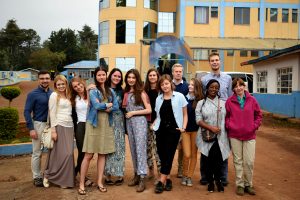
It is no feat to bring something to Africa. The challenge is to present it to others and show them how to use it. Such was the case with a portable ventilator brought by students from Poznań. It is difficult to describe the pure joy of a Kenyan anaesthetist working in an operating room, who was familiar with all modes of ventilation and knew all the important parameters by heart, but could not make use of that knowledge because there was no appropriate equipment. This has fortunately changed.
Monika and Dawid are two out of over 40 students who spent (or are still spending) their holidays helping hospitals all over Kenya. It is both a mission and a personal adventure. After all, working in a hospital is not only about procedures, equipment and facilities, but – most importantly – about thankful and good-hearted patients in need of help. And Kenya itself, though sometimes unpredictable and dangerous, provides unforgettable experiences.
Was the mission successful? One morning, nurses working at the hospital said that they had managed to save the lives of two newborns, because Wazungu (white people) had showed them how to correctly resuscitate babies. This seems like a good answer to the question.
Human life is the greatest value. Even though the mentality of Africans is so strikingly different from ours, this particular belief is something that we all have in common.
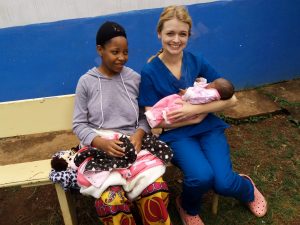 Monika and Dawid have already returned to Poland, hoping that „Treatment with Mission” could contribute to more such happy endings.
Monika and Dawid have already returned to Poland, hoping that „Treatment with Mission” could contribute to more such happy endings.
